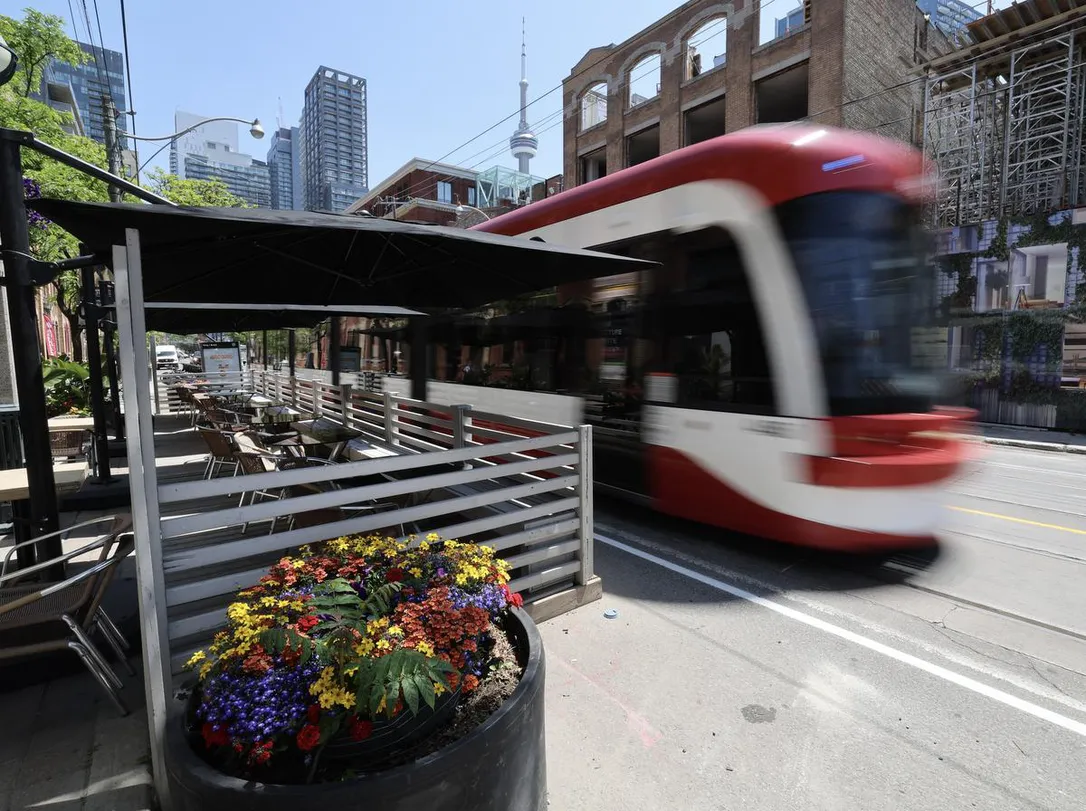One of the most enraging things about the recent news of delays in this spring’s CaféTO patio approvals — hindering the rollout of curbside restaurant and bar patios that have become familiar the past few years — is that it’s all so predictable.
In January, the city seemed intent on taking a good thing and, in trying to make it permanent, ruining it. The proposal that came forward seemed certain to bury street patios in red tape and fees. There was an outcry. So the proposal was altered to make it less restrictive.
Then what happened? Well, first came news that even with the less onerous fees and restrictions, applications were down significantly (from 837 permits in 2022, to 500 for this year). And then, about a week ago, the complaints that many restaurants and bars are still waiting — in June — for approvals that would allow them to plan for a patio, order the required platforms and equipment, and set them up.
The city’s media relations department says this is just normal. All part of “detailed reviews of applications to ensure road safety and other concerns.”
Let me make this as clear as I can: the patio season in Toronto is short, maybe 100 days a year. If the “detailed review” process you’ve set up for patio approvals takes well into the warm weather patio season to conclude, then you’ve botched it.
And the thing is, we all knew they would. We hope — ever hope — that just once Toronto won’t step on a rake when trying to do something easy to make the city a better place to live, but who among us expects it? Google “Toronto a la Carte” — or “Toronto food trucks” or look at the seemingly simple proposals to allow people to have a beer in the park, or try every year for decades to sign your kid up for swimming lessons — and see the evidence: there is no desirable thing our city cannot completely stomp out with a process that claims to encourage it.
There’s an open lane here for a mayoral candidate to exploit: easy things should be easy, basic things should be basic, desirable things should be welcomed and encouraged. That they are not is something for a government to fix.
Here’s the core thing to understand: these patios make the city a better place — they are good for business, good for neighbourhoods, good for the liveliness of streets. We should be begging shopkeepers to install them. Instead we’ve made it difficult.
That’s something else we’re good at in this city: finding something we actively want or need people to do, and then making them jump through (often expensive) hoops to do it.
Building midrise apartments or even duplexes and triplexes to increase housing supply, for example: our official plans have long claimed to want to encourage these things, and our residents have desperately needed them. But for years, we have buried anyone trying to build them in expense and paperwork and an endless gauntlet of angry political meetings.
The process is a punishment. And few people willingly endure punishment (especially when, in the case of building housing, they could build 60 storeys by enduring the same process, or build one single family home with no hassle at all).
So those things we claim to want, we do not get. Maybe in the case of duplexes and such, this will finally change with the most recent bylaw passed by city council. But in general, we still take an official approach that things that benefit the city must be considered privileges that those providing them pay dearly for. It isn’t just that we can’t have nice things, it’s that anyone trying to provide us nice things ought to be made to suffer for doing it. Or if not suffer, at least pay the city in time and money and hassle.
Here’s another thing: these street patios were one of the silver linings of the extremely dark cloud of the pandemic. They were a way of making do, and trying to help everyone get through, but once they were in place they were self-evidently an improvement over the pre-pandemic streetscape. One it’s hard to envision this particular city ever having seen in action without the pandemic.
Zooming out for a moment, that phenomenon would have been one of the bigger silver linings of the pandemic experience. We learned that when our backs are against the wall, we can do things, through our government, together — and we can do them quickly. People went home from work for months and the federal government made sure they could still feed themselves, the city got thousands of homeless people into hotels, we scaled up a massive vaccination campaign — both making them available and convincing people to get them — in short order. We transformed summer streets into lively patio spaces.
A lot of things, big and small, that those of us who fancy ourselves realists might not have thought the government would have the capacity or capability to do. We came through a crisis, and might have rightly understood that not only could we do such things decently and in a hurry, but we did do them. Some cities, like Paris, explicitly used the occasion of the pandemic to rethink how public space in the city is allocated — making transformative changes that will have long term quality of life and environmental benefits.
And yet here at home, as our fear of and explicit reactions to the pandemic have faded and things return to what we’d always thought of as normal, it feels like our ideas of what we can and should accomplish have returned — depressingly — to what we’d always thought of as normal too. Or worse. Cutting service levels to make up for strained budgets. Having the same old boring fights about bike lanes.
And throttling the number of street patios with new costs and regulations, and then dragging our feet on actually letting them set up. It’s not that we didn’t expect this. It’s that our experience of the pandemic showed we could easily expect better.

